Hannah Dean – Strange Man
Columbia 3-41929 US 33RPM Released 1961
Track 1: Strange Man
I picked up this haunting love song a few years ago, but since, I haven’t really been able to find a lot about the singer or the release. Well, regardless of my inability, here’s a brief post hoping someone out there can shed some light on this relatively unknown singer.
So what 45Cat and Discogs are telling me, is that she did have 4 single releases from 1960 to 1963, all on Columbia. Her first single was an upbeat blues rocker called, Itty Bitty Love, flipped with the lovely slow and swaying So Little Time. Predominantly released in the US early in 1960, however 45Cat shows an odd distribution here in Australia later that same year, on the CBS Coronet label. It also actually looks like a panel sheet-sleeve came with a promotional record for this release, with a picture of the beautiful Hannah!
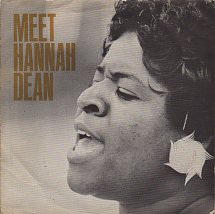 A 45Cat member who is fortunate enough to have a copy, also gratefully shares the back cover, and reads this about Dean…“Hannah Dean’s style is a mixture of rhythm and blues and rock n’ roll sung with the feeling and unbuttoned phrasing of a gospel singer”. Irving Townsend, Executive Producer for Columbia Records in Hollywood, sent this personal evaluation of Hannah Dean’s talent to Columbia’s producers in New York along with Hannah’s first record – “So Little Time” backed with “Itty Bitty Love.”
A 45Cat member who is fortunate enough to have a copy, also gratefully shares the back cover, and reads this about Dean…“Hannah Dean’s style is a mixture of rhythm and blues and rock n’ roll sung with the feeling and unbuttoned phrasing of a gospel singer”. Irving Townsend, Executive Producer for Columbia Records in Hollywood, sent this personal evaluation of Hannah Dean’s talent to Columbia’s producers in New York along with Hannah’s first record – “So Little Time” backed with “Itty Bitty Love.”
The response was rapid. They agreed down to the last man. Hannah’s unique vocal quality is understandable because she has been a gospel singer since she was two and still sings regularly in a Los Angeles Baptist Church where her mother serves as minister. Until two years ago she was a Los Angeles house wife, completely unaware that she could be an extraordinary popular singer.
She was heard at a church by a Los Angeles talent scout who suggested immediately that Hannah should consider a popular career. Hannah told him frankly that she had no formal training and only sang popular music to herself and a few friends. Nevertheless, she was bolstered by his confidence and agreed to make the demonstration record which soon after brought her a Columbia recording contract. Hannah’s Dean’s first record launches for her a career as promising as it was unanticipated.
I also came across a fellow blogger with similar record collecting habits, and found a link on their The Listening Post blog, that pointed me to this short review from The Billboard dated September 5, 1960. It reads… HANNAH DEAN is a new name on the scene via the release of her first Columbia Record, ‘So Little Time/Itty Bitty Love’. Until two months ago she was a Los Angeles housewife whose only singing outlet was the L.A Baptist church. She was heard at the church by a talent scout who encouraged her to make a demonstration record that found its way to Columbia Records and resulted in a contract. Irving Townsend, Executive producer for Columbia in Hollywood, describes Miss Dean’s style as a “mixture of rhythm and blues and rock’n’roll sung with the feeling and unbuttoned phrasing of a gospel singer.”
In 1962, Dean released Open Sesame / Without your Love. At this very time, I cannot find even a sound bite of this release. There are a couple of copies on ebay (not big money) but unfortunately not one seller supplies an audio sample. So I’m at a loss to tell you anything about this one.
Dean’s Gospel righteousness roots and vocal capabilities come out for her 1963 release You, You, You. The B side High Noon has everything I love about the beautiful popcorn genre, and now makes me want to get my hands on a copy.
So back to Strange Man. I can’t for the life of me figure out why this release is quite unknown, especially as it sits on one of the bigger labels. The production is absolute killer. It has all the ingredients, the devilish blues guitar work from intro to end, the flute, Dean’s deep soul lines as well as the backing vocals, all sitting in the exact right place. When I hear tracks like this, I am aware this is no lost recording accident. Everyone in that recording studio at that time knew what exactly was being produced. Imagine as a musician, coming home from the studio late at night and realising what you were just a part of. And being in the midst of this truly holy and graceful Hannah Dean! January 16, 1961 Billboard Music Weekly states “Strange Man – On this side the thrush turns in another attractive performance on an unusual piece of bluesy material. Two sides show off her strong pipes”.
On the flip is one of many many covers of (I’m Afraid) The Masquerade Is Over, originally released in January 20, 1939, by Larry Clinton and His Orchestra, with Vocal Refrain by Bea Wain. I might go to hell for saying this, but Dean’s version is smoking hot. There’s something about her commitment that maybe can only come from that very deep part of the soul of a gospel singer. There are some beautiful versions of this song out there, from artists including Stevie Wonder, Marvin Gaye, Nancy Wilson and my personal favourite from Aretha Franklin, and this Dean version sits up high along side these.
So where does this odd 33rpm 7″ release fit in? To be honest, I’m not sure as there’s no catalogue I could find online of this particular release. There is one small hint which is Columbia Marcas Reg. appears on the label, so possibly this is a Spanish release. But Marcas is also Portuguese, and as many Brazilian 7’s come with the 33rpm format, maybe this is it’s origin?
Should we be sad that so many of these unknown songs that surface today, are hidden in the past with no real leads to the artist and their faces? Or should we respect their gospel roots and maybe it was their decision that stardom and popularity wasn’t something as important to them. Tonight, with the lights dimmed down low, I can place the needle down gently, and be grateful that singers like Hannah Dean did gift us with at least a few beautiful songs we can hear and appreciate today. And be thankful, many years ago, these great ladies did have that fleeting time behind that microphone, that is here to stay, and forever.
I hope you can also hear the honest beauty of this track and Hannah Dean. She passed away on May 6, 2004 at the age of 71.
UPDATE! So thanks to my good friend Kristy, who knows how to really dig deep into the hidden corners of the internet, some light has been shed onto Hannah and her career path. It looks like Hannah pursued an acting career in theater and also had a good run in film and TV. Although looks like many TV roles were the type cast “maid” characters and similar. Thanks to DJ Soup for also recognising her as an actress.
Here’s some, but not all of her screen appearances and plots…
The Black Six Hannah Dean as Mrs. Daniels – 1973 “Six times tougher than Shaft! Six times rougher than Superfly! See the 6 biggest, baddest and best waste 150 motorcycle dudes!” A black high school student is caught dating a white girl by the girl’s brother. He and his white supremacist motorcycle gang beat the boy to death. The boy’s brother an African American veteran of the Vietnam War hears about it and his motorcycle gang, known as the Black Six, vow to avenge his brother’s death.
The World’s Greatest Lover 1977 Hannah Dean as The Maid Directed and written by Gene Wilder Starring Dom DeLuise as Adolph Zitz and Carol Kane as Annie Hickman. A neurotic baker travels to Hollywood to attend a talent search for an actor to rival the great Valentino. Although not an actor, through blind luck he succeeds, to a certain degree.
Every Girl Should Have One 1978 Hannah Dean as Ernestine. Also starring Zsa Zsa as Olivia Wayne, and Z-man himself, John Lazar as Chris. A million dollar diamond theft involving unlikely thieves, zany lovers and a fast talking maid sets this comedy caper zooming from sophisticated discos to exciting chase scenes all in a spirit of good, innocent fun.Mother, Jugs & Speed 1976 Looks like Hannah may be unaccredited in this American black comedy film? It stars Bill Cosby as Mother, Raquel Welch as Jugs, Harvey Keitel s Tony “Speed” Malatesta, and Larry Hagman as employees of an independent ambulance service trying to survive in Los Angeles. Also stars Toni Basil as the junkie.
Out Of The Blue 1979 12 Episodes Hannah Dean as Gladys (The house keeper) This one was a popular but brief TV show about Random, an angel-in-training who is assigned to live with a suburban Chicago family, while trying to earn his wings by doing good deeds. Hannah had a big part in this series.
This article was found on the Star Tribune (Minneapolis, Minnesota) Sun, Sep 30, 1979.
Hannah Dean was born into music in her Native New Orleans. She was giving concerts in church at the age of 3 and literally sung her way through life. She completed a 6 month run of “The Evolution of the Blues” on stage just before the production start of “Out Of The Blue”.
After her sixth child and the Watts Riot inadvertently started her on her acting career. She had decided to cancel all singing dates until after h the birth but worked with young people in Watts teaching choral work. In 1965, following the riot, her Watts Community Youth Choir became affiliated with the Mafundi Institute…a culture center created in the devastated area. There she won a role in the stage production “Don’t Bother Me, I Can Cope”. This led to other theatrical productions that included Porgy and Bess with Mickey Rooney.
She began recording in the early 50’s with a gospel song “Every Day and Every Hour” with The Branch Gospel Singers. This was followed by “Baby My Love” on an obscure label and then she was signed by Columbia Records where she recorded “So Little Time” Without Your Love” and Itty Bitty Love (backed by The Blossoms). At this time, she meet songwriter Jon Hendrick, who had just written “The Evolution Of The Blues” Some of the numbers were sung by Mahalia Jackson at the Monterey Jazz Festival. Jackson cancelled her tour and Columbia’s Erwin Townsend Suggested Dean. She received a standing ovation which prompted Columbia to record “Evolution” with Dean singing the gospel songs. Dean went on to sing “Evolution” at the Newport Jazz Festival, Carnegie Hall and on a Canadian tour.
The Jon Hendricks LP release of Evolution Of The Blues Song from 1960 was released on Columbia and credited with The Hannah Dean & Chorus. Hendricks is one of the originators of vocalese, which adds lyrics to existing instrumental songs and replaces many instruments with vocalists, and is considered one of the best practitioners of scat singing. A very interesting article discovered here, on the live performance of Evolution Of The Blues, with a brief interview from Hendricks and Dean.

Also found this but not too sure what release it is attached too? “Hannah Dean Explains it All”
Link to Getty image of Hannah Dean publicity portrait for Columbia Records in 1963.
Bobby Day – Pretty Little Girl Next Door

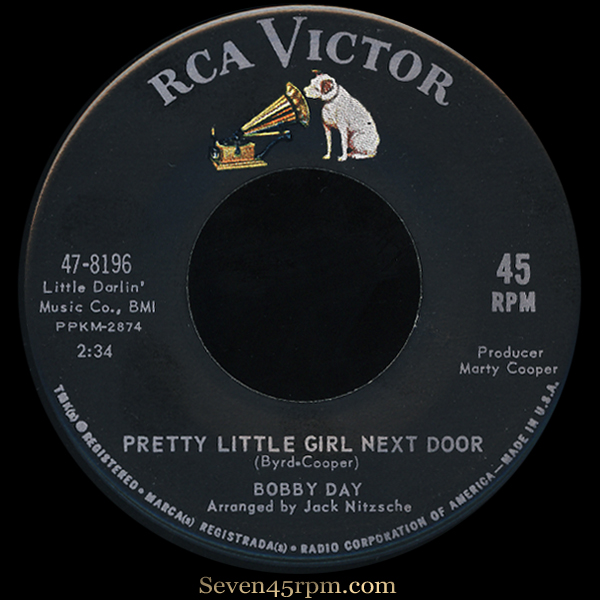 RCA Victor – 47-8196 US Year 1963
RCA Victor – 47-8196 US Year 1963
Track 1 – Pretty Little Girl Next DoorTrack 2 – Buzz Buzz Buzz
Okay, first thing’s first…Robert Byrd, alias Bobby Day, of the Hollywood Flames, who were formerly The Flames, is not to be confused with Bobby Byrd of the Famous Flames, who were formerly…The Flames…got that? Good!
Robert James Byrd was born July 1, 1928, in Fort Worth Texas, and moved to Los Angeles in 1947. His first vocal group, The Flames, originated in 1949, when all members were in there teens. They all met at the Largo Theater in Watts at a talent show given by the theater’s owner, which brought together many singers from various high schools in Los Angeles.
Bobby strung together tenor David Ford, second tenor Willie Ray Rockwell and eventually Curlee Dinkins, who sang baritone and bass (Byrd would sing bass, baritone, tenor). They quickly learned how to sound pretty darn good together, and as they all needed to earn some dosh, they decided to brave up to an audition they had heard about at the Johnny Otis owned Barrelhouse. They started winning a few prizes here and there and were offered a few little jobs, sometimes making five dollars each.
The Flames existed from 1949 to 1966. In that time, they recorded under a bewildering variety of names (Four Flames, Hollywood Four Flames, the Jets, the Ebbtides and the Satellites), for a bewildering number of labels, with a bewildering cast of personnel.
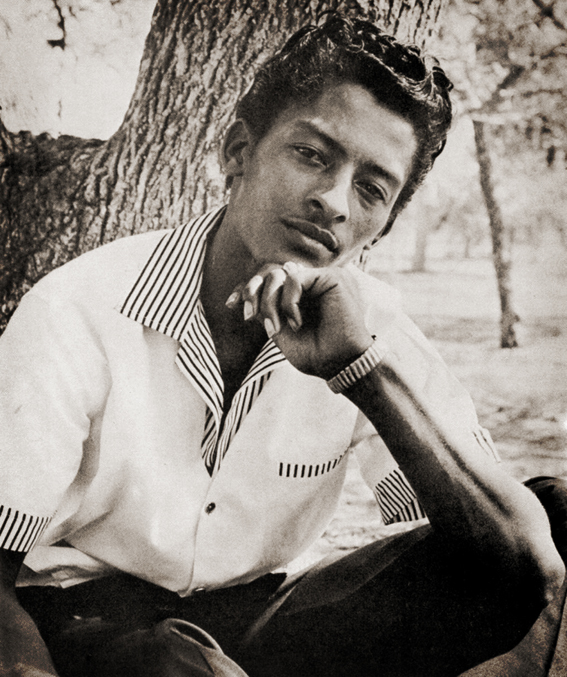 In ’57, Byrd penned and recorded the great, Buzz Buzz Buzz, (Earl Nelson on lead) as The Hollywood Flames on Ebb. When the song became a hit, Bobby found out that he didn’t have any publishing rights and only half the writer credit…and never received any money owed to him. That same year with his back up group the Satellites, he also wrote and recorded (as Bobby Day) the fab foot tapping hand clapping Little Bitty Pretty One, released by Class in August. Popularized with success for Thurston Harris, whose release beat Bobby’s out the gate, it reached No. 6 on the U.S. Billboard Hot 100 and No. 2 on the R&B chart…but I much prefer Bobby’s!
In ’57, Byrd penned and recorded the great, Buzz Buzz Buzz, (Earl Nelson on lead) as The Hollywood Flames on Ebb. When the song became a hit, Bobby found out that he didn’t have any publishing rights and only half the writer credit…and never received any money owed to him. That same year with his back up group the Satellites, he also wrote and recorded (as Bobby Day) the fab foot tapping hand clapping Little Bitty Pretty One, released by Class in August. Popularized with success for Thurston Harris, whose release beat Bobby’s out the gate, it reached No. 6 on the U.S. Billboard Hot 100 and No. 2 on the R&B chart…but I much prefer Bobby’s!
But the next year Day was the first to record Leon Rene’s (under the pseudonym of Jimmie Thomas) Rock-in’ Robin…the perfect counter attack, and Day’s most recognize and successful recording, which became Number 2 hit on the Billboard charts! Its flip, “Over and Over,” was a hit in its own right, and a cover by Dave Clark Five in ’65, brought a much more hip, modern youthful version back to the dance floors!
Bobby Day went on to partner with Earl Nelson and recorded as Bob & Earl from 1957 to 1959 on Class.
Moving on to 1963, and Bobby releases the incredibly uplifting Pretty Little Girl Next Door on RCA. I’m sure everyone reading this, has one song that they can rely on, that will always bring themselves a big damn smile, no matter what life is throwing at you! This is mine! From beginning to end, it’s a quite the pleasant build up. With it’s sweet caterpillar like beginnings, it quickly sprouts it’s wings and soars! The slinky groove grows, and it soon smothers you. And I’ve proved that this song can and will draw everyone within a kilometer radius of your turntable, onto your dance floor. Day gives it his all…he really shines in this one, and of course those gorgeous female backing vocals brings it all into perfect harmony! Imagine seeing this performed live by Mr.Day in ’63!
And on the flip, what a delight to have a revisit of his early Buzz Buzz Buzz! Just as great as the original, however this version may have a slower tempo, but certainly holds a stronger groove…and much more developed for the early sixties hipster dancers. Both tracks produced by genius Jack Nitzsche!
Bobby Day died from cancer on July 27, 1990, in Los Angeles and was buried in Holy Cross Cemetery in Culver City, California. He was survived by his wife, Jackie, and four children. He may not have had the successive chart success he very well deserved (he never achieved another Top 40 Hit apart from Rock-in’ Robin), but in my book, he was just as important as the best of them, especially with his major part in the early days of doo wop! He always lifts me, and Pretty Little Girl just makes me drunk with happiness!
Essential reading for a very in-depth and thorough journey with Bobby Day and his Hollywood Flames, by Marv Goldberg…The Hollywood Flames.
Marie Knight – Come On Baby (Hold My Hand)

 Okeh 4-7147 US Year 1962 Marie Roach was born June 1, 1925, in Sanford, Florida, and grew up in Newark. At the sweet little age of 5, she impressed the congregation at her parents church by singing the gospel song Doing All the Good We Can, and of course later became a soloist in her church’s youth choir.
Okeh 4-7147 US Year 1962 Marie Roach was born June 1, 1925, in Sanford, Florida, and grew up in Newark. At the sweet little age of 5, she impressed the congregation at her parents church by singing the gospel song Doing All the Good We Can, and of course later became a soloist in her church’s youth choir.
In 1939, the young lady first toured with Evangelist Frances Robinson, touring the national gospel circuit (she married preacher Albert Knight in ’41 but divorced later).
In 1946, she made her first recordings as a member of The Sunset Four (aka Sunset Jubilee Singers) for Signature and Haven (these labels would merge, but became defunct at the end of 1960 after being purchased earlier in the year by Roulette Records), and released a mighty fine handful of spiritual releases.
The now legendary guitar playing Sister Rosetta Tharpe, who was a major recording artist on the Decca Records label, and who many would say, brought gospel music to a broad audience, first heard Knight sing at a Mahalia Jackson concert in New York in 1946. Tharpe recognized “something special” in Marie’s contralto voice, and two weeks later, she showed up at Knight’s house in Newark, N.J., to invite her to go on the road with her.
Tharpe and Knight toured through the late ’40s, appearing in clubs, arenas, churches and auditoriums, sometimes acting out the parts of “the Saint and the Sinner”, with Tharpe as the saint and Knight as the sinner.
Together they had plenty of successes, including Up Above My Head, credited jointly to both singers, and reached # 6 on the US R&B at the end of 1948. The great Didn’t It Rain also did well and Knight’s solo version of Gospel Train reached # 9 on the R&B chart in 1949.
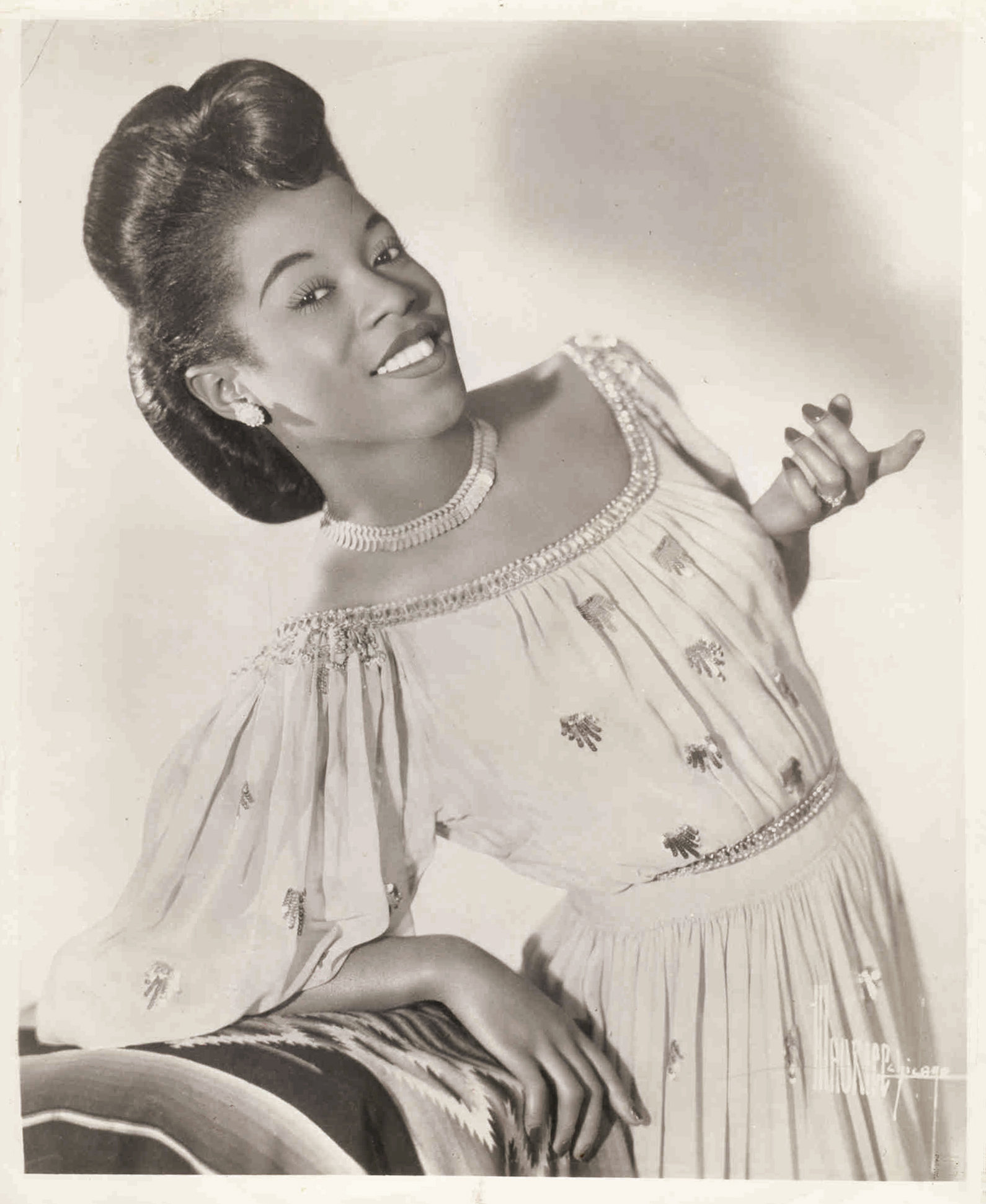 Knight left Tharpe to go solo around 1951, and released further more gospel recordings on Decca. But around April 1954, Marie Knight makes a change as she records straight ahead R & B songs I Know Every Move You Make and You Got A Way Of Making Love. These Rhythm & Blues tunes may have turned away a great many of Knight’s gospel fans, but she continues this move with a release during July of This Old Soul Of Mine and I Tell It Wherever I Go, and a November release of Trouble In Mind and What More Can I Do.
Knight left Tharpe to go solo around 1951, and released further more gospel recordings on Decca. But around April 1954, Marie Knight makes a change as she records straight ahead R & B songs I Know Every Move You Make and You Got A Way Of Making Love. These Rhythm & Blues tunes may have turned away a great many of Knight’s gospel fans, but she continues this move with a release during July of This Old Soul Of Mine and I Tell It Wherever I Go, and a November release of Trouble In Mind and What More Can I Do.
Both Knight and Tharpe’s friendship has stayed very strong and close, and in ’55, they get back into the recording studio together and release Stand and Storm on Decca, and together they score a two week stand at Chicago’s Black Orchid. In October, Knight lands a part of the lineup of the “Lucky Seven Blues Tour” along with Earl King, Little Willie John and other greats! Soon after the tour is over, she signs on for another all star touring show called the Rock ‘n’ Roll Jubilee which kicks off at L.A.’s Shrine Auditorium and again features star players including B.B. King, the classy Shirley Gunter, and sax cat Hal Singer.
In the spring of ’56, Knight follows her close friend Tharpe, from Decca to Mercury Records. While a couple more gospel releases sprouted once again, Knight decides to release another R&B beauty Grasshopper Baby (flip to Look At Me). In march of 1957 Mercury brings out the doo-wopping Am I Reaching For The Moon? and I’m The Little Fooler. In ’59, Knight and Tharpe record together again, and release Shadrack on Decca, which has to be one of my top picks from their almighty strong partnership!
1961 saw the release of the Knight bomb To Be Loved By You on Addit…you need to hear this if you don’t know it…amazing! That same year she recorded Come Tomorrow, released on Okeh, a tune which became much more famous after it was covered four years later by British rockers Manfred Mann.
And in ’62, she hits us with this…Come On Baby (hold my hand), again on the Okeh label. Quite slinky for Miss Knight, and you can’t help but feel this kinda tune has been waiting to burst out from her for some time. Another heart felt sound about love, but much more personal here than say spiritual. Not a lot can be found about this Roy Glover arranged session, and why this track is very rarely mentioned when reading up on Knight is a mystery to me, but it is well respected in the R&B community and on many collector’s want list for good reason.
Knight recorded and released a bunch more 45’s with various labels up til about 65, then slowly faded away from the scene. Her ripping version of Cry Me a River reached # 35 on the U.S. Billboard R&B charts in ’65, and was a powerful stamp to close an important chapter.
Knight remained friends with Tharpe, and helped arrange her funeral in 1973. In 1975, having given up performing secular music, she recorded another gospel album, Marie Knight: Today.
In 2002, Knight made a comeback in the gospel world, recording for a tribute album to Tharpe. She also released a full-length album, Let Us Get Together, on her manager’s label in 2007. She died in Harlem of complications from Pneumonia on August 30, 2009, but her legacy will live on…no doubt about it!
Laura Johnson – I know how it feels
Track 1 – I Know How It Feels Track 2 – Wondering If You Miss Me
This heart wrenching soul ballad is an absolute pearl and one I keep very close to my heart. A song to play late at night, with a stiff hard drink, on your own (well maybe with a pet friend), and not one that I play in public too often. A mysterious recording, certainly not an easy one to find particular specs on, so I had to visit my fav’ research web site Soulful Detroit once again for most of the info here.
Laura Johnson, an amateur singer from Detroit, who happened to work in the Correc-tone’s offices, paid for her own studio time and recorded these two stirring tracks at Wilbert Golden’s legendary Correc-tone studios. The self-penned “Wondering If You Miss Me”, and “I Know How It Feels”, which was written by infamous Popcorn Wylie and Motown’s Janie Bradford, and produced by Robert Bateman, were released in ’62 on Bob Shad’s New York Brent label. It’s likely that Correc-tone’s session musicians of that time, bassist James Jamerson, drummer Benny Benjamin and guitarist Robert White recorded on these tracks, but I can’t confirm that. I’m pretty sure that’s the incredibly beautiful “Andantes” backing her up here.
Laura also had a hand in writing a couple of gems cut by Marva Josie, including the excellent “Later For You Baby” which was released on Brent’s sister label,Time, also released in ’62.
“I Know How It Feels” was earlier released by The Satintones on Motown (the first band to ever record for that label) in ’61, then also with The Marvelettes on their Please Mr.Postman LP debut, that same year in November. Both versions are a delight in their own ways, but Johnson gets the badge of honor for me.
Seems not too many people out there really knew much more about this elusive artist and these remarkable isolated recordings. Sadly, it doesn’t look like Johnson was to ever record again, and with that remarkable tone, it’s the greatest shame!



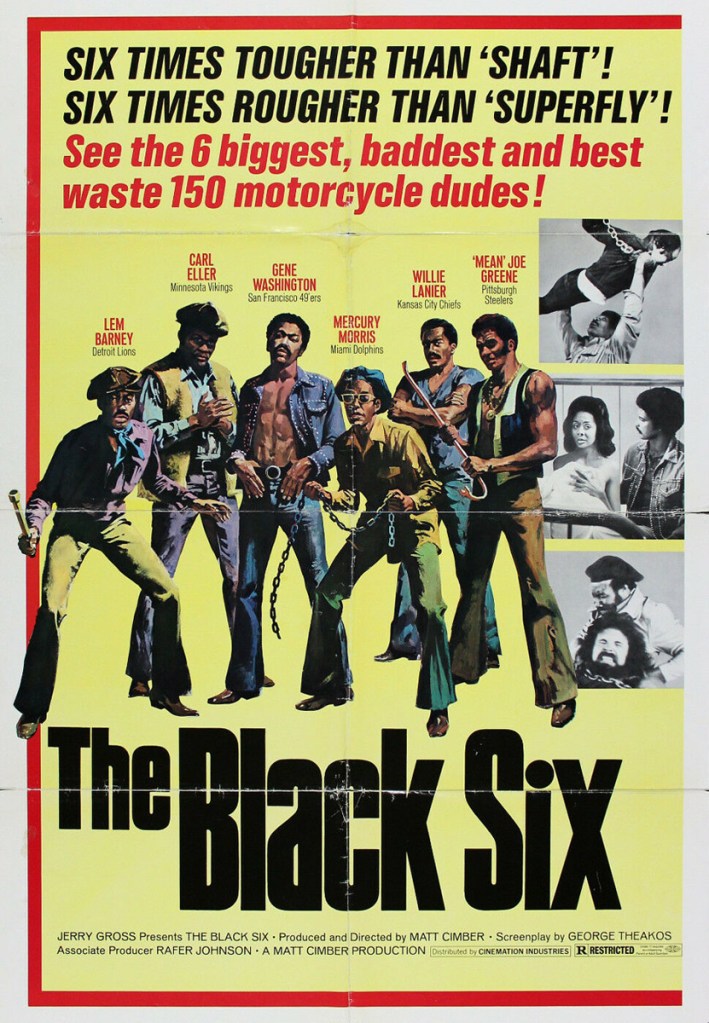
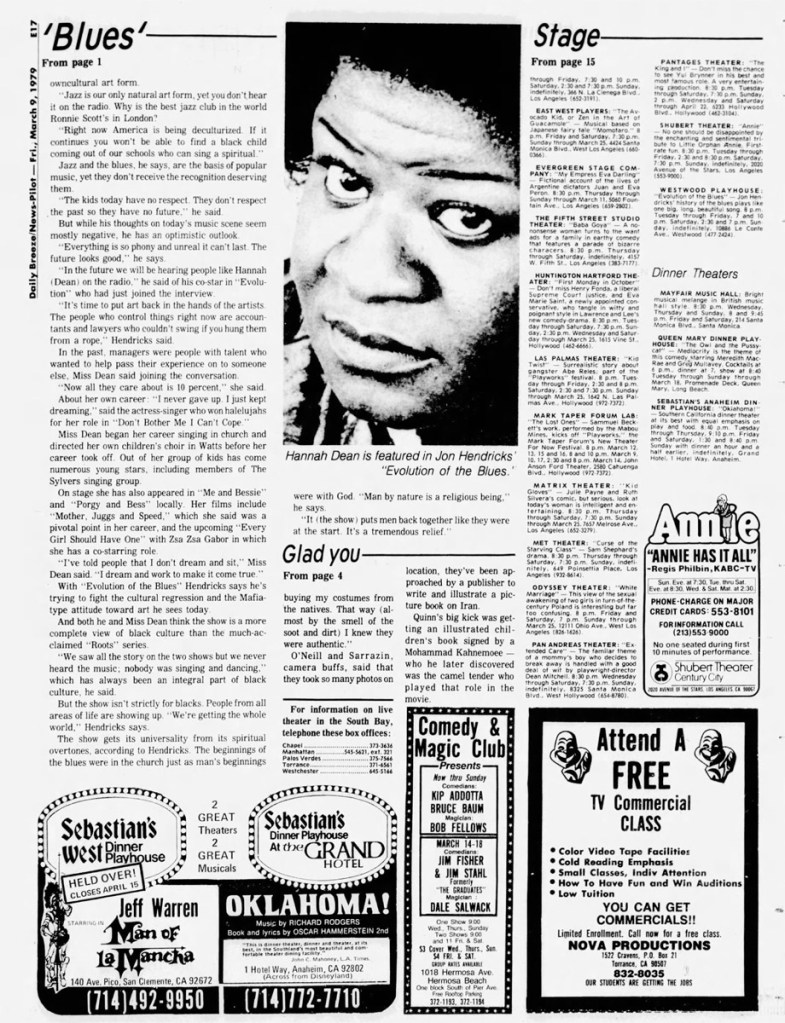


Recent Comments